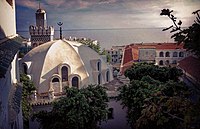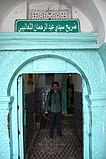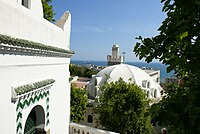Zawiya Thaalibia (Algiers)
You can help expand this article with text translated from the corresponding article in Arabic. (December 2020) Click [show] for important translation instructions.
|
الزاوية الثعالبية | |
 Zawiya Thaalibia | |
Other name | زاوية سيدي عبد الرحمن الثعالبي |
|---|---|
Former name | زاوية قصبة الجزائر |
| Type | Zawiya |
| Established | 1460 CE / 864 AH |
| Founder | Sidi Abd al-Rahman al-Tha'alibi |
| Affiliation | Ministry of Religious Affairs and Endowments |
Religious affiliation | Qadiriyya, Rahmaniyya |
| Address | , , , 16022 , 36°47′18″N 3°03′34″E / 36.7884592°N 3.05956°E |
| Language | Arabic, Berber |
 | |
The Zawiya Thaalibia (Arabic: الزاوية الثعالبية) or the Sidi Abd al-Rahman al-Tha'alibi Zawiya (Arabic: زاوية سيدي عبد الرحمان الثعالبي) is a zawiya in the Casbah of Algiers in the commune of Casbah in Algeria. The name "Thaalibia" relates to Abd al-Rahman al-Tha'alibi.[1][2]
Presentation
[edit]Sidi Abderrahman established in the Casbah of Algiers this zawiya in 1460 CE, according to the Qadiriya tariqa, in order to recommend the murids and the saliks.[3][4]
When he died during the year 1471 CE, corresponding to the year 875 AH, he was buried in a room inside his corner.[5][6]
A mausoleum of his own was built immediately after his death to protect his grave from any damage resulting from the influx of visitors, the blessed and the supplicants.[7][8]
Compartments
[edit]The structure of this institution is divided into compartments:[9][10]
- Zawiya Thaalibia.[11]
- Thaalibi Mosque.[12]
- Thaalibia Cemetery.[13]
- Thaalibi Mausoleum.[14]
Gallery
[edit]-
Zawiya Thaalibia
-
Zawiya Thaalibia
See also
[edit]References
[edit]- ^ "بوابة الترويج السياحي الجزائري | زاوية سيدي عبد الرحمن الثعالبي أو زاوية قصبة جزائر بني مزغنة". visitalgeria.dz. Retrieved 2020-12-16.
- ^ ""سيدي عبد الرحمن".. عبق الجزائر المحروسة - الحوار الجزائرية". elhiwardz.com. Retrieved 2020-12-16.
- ^ "Les Khouan: ordres religieux chez les Musulmans de l'Algérie". A Guyot. December 16, 1846 – via Internet Archive.
- ^ بليل, عبد الكريم; الاكاديمي, مركز الكتاب (January 1, 2018). التصوف والطرق الصوفية. مركز الكتاب الأكاديمي. ISBN 9789957353346 – via Google Books.
- ^ Rinn, Louis (December 16, 1884). "Marabouts et Khouan. Étude sur l'Islam en Algérie". Alger, A. Jourdan – via Internet Archive.
- ^ بليل, عبد الكريم; الاكاديمي, مركز الكتاب (January 1, 2018). التصوف والطرق الصوفية. مركز الكتاب الأكاديمي. ISBN 9789957353346 – via Google Books.
- ^ "les marabouts" – via Internet Archive.
- ^ مؤلفين, مجموعة; السياسات, المركز العربي للأبحاث ودراسة (January 1, 2020). العرب: من مرج دابق إلى سايكس – بيكو (1916-1516) - تحولات بُنى السلطة والمجتمع: من الكيانات والإمارات السلطانية إلى الكيانات الوطنية. المركز العربي للأبحاث ودراسة السياسات. ISBN 9786144453247 – via Google Books.
- ^ Benaissa, Omar (December 16, 1999). "Le soufisme algérien à l'époque coloniale". Horizons Maghrébins - le droit à la mémoire. 41 (1): 91–103. doi:10.3406/horma.1999.1843 – via www.persee.fr.
- ^ موسوعة العلماء والأدباء الجزائريين . الجزء الأول، الحروف أ، ب، ت، ث، ج، ح، خ. Al Manhal. January 1, 2014. ISBN 9796500167800 – via Google Books.
- ^ Haddad, Mouloud (December 15, 2010). "Les maîtres de l'Heure. Soufisme et eschatologie en Algérie coloniale (1845-1901)". Revue d'histoire du XIXe siècle. Société d'histoire de la révolution de 1848 et des révolutions du XIXe siècle (41): 49–61. doi:10.4000/rh19.4043 – via journals.openedition.org.
- ^ "التصوف و المتصوفة في الجزائر العثمانية ما بين القرنين السادس عشر و الثامن عشر Sufism and Sufis in Algeria Ottoman between the sixteenth and eighteenth". ResearchGate. Retrieved Feb 25, 2021.
- ^ Benaïssa, Omar. "ALGERIAN SUFISM IN THE COLONIAL PERIOD" (PDF). Retrieved 2023-08-25.
- ^ قيدار ،الدكتور, قويدر (January 1, 2020). دينامية النص الصوفي - بحوث ودراسات في التصوف الإسلامي. Dar Al Kotob Al Ilmiyah دار الكتب العلمية. ISBN 9782745192875 – via Google Books.



![Mosque of Sidi Abderrahmane Et-Thaalibi [ar]](http://upload.wikimedia.org/wikipedia/commons/thumb/1/15/Plan_sidi_abderrahmane.jpg/159px-Plan_sidi_abderrahmane.jpg)


